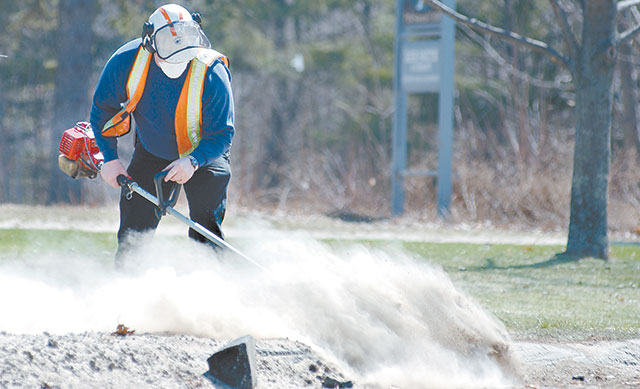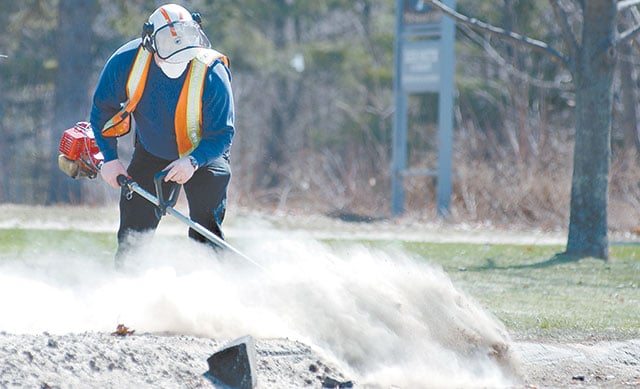
 Using a mask to keep the silica dust from entering his lungs, an employee of Maine State Highway Maintenance Department sweeps a large quantity of the harmful salt-laced road sand. Unions say hundreds of workers die each year from silica exposure, but William Wehrum argued on behalf of industry groups that new standards go too far. (Photo by Portland Press Herald via Getty Images)
Using a mask to keep the silica dust from entering his lungs, an employee of Maine State Highway Maintenance Department sweeps a large quantity of the harmful salt-laced road sand. Unions say hundreds of workers die each year from silica exposure, but William Wehrum argued on behalf of industry groups that new standards go too far. (Photo by Portland Press Herald via Getty Images)
Last week, attorney William Wehrum appeared before a federal court to argue against new standards meant to protect workers from airborne silica dust, which is so fine that particles can penetrate deep into the lungs and cause health problems, such as fatal lung disease and cancer.
This week, Wehrum will appear before the Senate Environment and Public Works Committee because President Trump has nominated him to head the Environmental Protection Agency’s (EPA) clean air program, where he worked under the Bush administration a decade ago.
The new silica rules developed by the Occupational Health and Safety Administration cut the amount of cancerous dust allowed in the air at industrial facilities in half. Trade unions say standards should be even lower, and labor leaders lashed out at the Trump administration for putting workers’ lives on the line when officials delayed implementation of the rules earlier this year.
The unions say hundreds of workers die each year from silica exposure, but Wehrum argued on behalf of industry groups that the new standard goes too far.
“People are designed to deal with dust,” Wehrum reportedly told the court. “People are in dusty apartments all the time and it doesn’t kill them.”
As the Trump administration works to roll back environmental rules adopted by its predecessor, the nation’s most pressing questions over pollution are increasingly being decided in courtrooms rather than agency offices or legislative chambers. These legal battles pit federal regulatory agencies against the competing interests of polluters’ industries and environmentalists. Trump has been clear about which side he wants to work with.
Like EPA Administrator Scott Pruitt and other officials tapped to fulfill Trump’s promise to roll back environmental regulations, Wehrum’s immediate background is in litigation rather than working in a university laboratory or a federal air monitoring station. He currently represents coal, oil, gas and other polluting industries for an international law firm.
President Bush nominated Wehrum for the same position back in 2006 but withdrew the nomination after a year went by without approval from the Senate. Wehrum had served as the assistant director to the EPA’s clean air and radiation program under Bush, the last time a Republican administration focused the agency on gutting clean air rules. The New York Times called him a “doctrinal hit man” for Bush’s anti-regulation efforts at the time.
During Wehrum’s tenure, the EPA faced dozens of lawsuits from environmental groups over efforts to roll back protections laid out under the Clean Air Act. Environmental groups won 27 of these legal battles over the course of 7 years, while the Bush EPA only prevailed in 11 cases, according to the Natural Resources Defense Council (NRDC).
“Under Wehrum’s leadership, the Bush air program did not just lose clean air lawsuits frequently; it lost them badly, by violating the plain language of the law egregiously, again and again,” wrote John Walke, director of the NRDC’s clean air program, in a blog post last month.
If the Senate confirms his nomination, Wehrum would oversee efforts to loosen clean air standards developed by the Obama administration. These standards include a plan to reduce smog and air pollution crossing state lines, as well as President Obama’s signature Clean Power Plan for capping climate-warming emissions from power plants.
Trump has promised to gut the Clean Power Plan, and Pruitt and the EPA are under orders to update a federal district court on its review of the regulations by the end of the week. The EPA is expected to propose replacing Obama’s plan with another that sets much lower emission reduction goals and has full support from the industry.
While Obama’s plan would have shuttered some of the nation’s oldest and dirtiest coal power plants and incentivized investment in cleaner fuel and renewables, Pruitt’s plan is likely to focus on equipment upgrades that the industry is willing to pay for in order to keep the current fleet of coal plants operating for years to come.
Last week, Energy Secretary Rick Perry proposed new regulations that would require utility companies to pay higher rates for electricity from aging coal and nuclear power plants in order to keep them in business even as cleaner and more efficient options become available.
“The coal and nuclear industries aren’t winning on the open market, so the Trump administration wants to rig the system for them,” said Ken Cook, president of the Environmental Working Group, in a statement. “This scheme would force millions of Americans to pay higher monthly utility bills to keep these dying, dirty and dangerous relics of the energy sector on life support.”
That’s bad news for anyone concerned about climate disruption and for the state of Maryland, which sued the EPA last week over air pollution blowing over its border from coal-burning power plants in neighboring states. Maryland argues that 19 coal plants in Kentucky, Indiana, West Virginia, Pennsylvania and Ohio have not been using smog controls as required by federal regulations, making it difficult for Maryland to comply with federal smog standards.
These are the same ozone and smog standards that Pruitt sued the EPA over when he was attorney general of Oklahoma, a state with a sprawling oil and gas industry blamed for air pollution that causes smog in neighboring states. Earlier this year, Pruitt attempted to delay implementation of the smog rules until 2018 but reversed course after facing lawsuits from environmental groups and state attorneys general.
Wehrum isn’t the only Trump nominee scheduled to appear before the Senate committee this week. The hearing will also feature Michael Dourson, Trump’s pick to run the EPA’s chemical safety office. Environmentalists say that Dourson has extensive ties to the chemical industry and, as a scientific consultant, has consistently produced assessments in the industry’s favor.
“Dr. Dourson’s consistent endorsement of chemical safety standards that not only match industry’s views, but are also significantly less protective than EPA and other regulators have recommended, raises serious doubts about his ability to lead those efforts,” said Sen. Tom Carper, the ranking Democrat on the committee considering the nominations, in an interview with the New York Times.
During Pruitt’s confirmation hearing earlier this year, Carper and other Democrats grilled the current EPA administrator about his record of fighting in court on behalf of polluters, but they were unable to convince lawmakers in the Republican majority to oppose Pruitt or other Trump nominees. Democrats are expected to grill Dourson and Wehrum about their industry ties, but blocking their confirmation appears to be an uphill battle.
Join us in defending the truth before it’s too late
The future of independent journalism is uncertain, and the consequences of losing it are too grave to ignore. To ensure Truthout remains safe, strong, and free, we need to raise $46,000 in the next 7 days. Every dollar raised goes directly toward the costs of producing news you can trust.
Please give what you can — because by supporting us with a tax-deductible donation, you’re not just preserving a source of news, you’re helping to safeguard what’s left of our democracy.